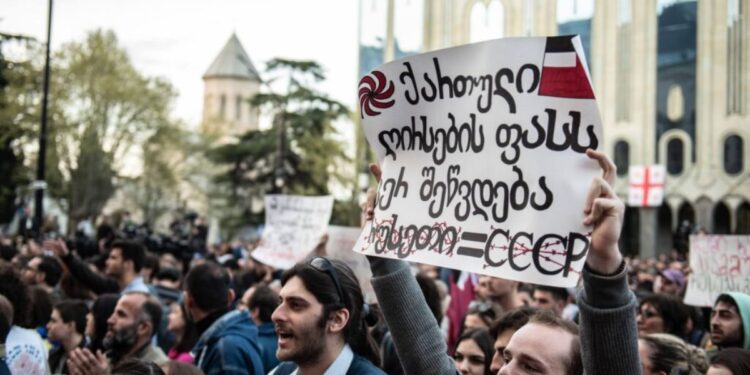Georgian authorities took aggressive measures to disperse pro-European Union demonstrators in the capital city of Tbilisi on Tuesday night. The protesters were expressing their opposition to a proposed “foreign agent” law, which bears similarities to the one implemented in Russia. Despite the use of tear gas and water cannons, many protesters remained undeterred and returned to voice their concerns.
Protesters, including some who were waving European Union flags, gathered in front of the country’s Parliament building to demonstrate. However, when the riot police attempted to disperse the crowd, they resorted to using force. The police beat and pushed the protesters away after tear gas and water cannons failed to have the desired effect.
Protesters, however, continued to show up on multiple occasions, resulting in intensified clashes and eventual arrests by the police. These incidents took place despite Georgia’s President Salome Zourabichvili instructing the interior minister to prevent any aggression towards peaceful demonstrators.
According to Politico, Zourabichvili expressed that the demonstration was peaceful and did not pose any danger or threat to public order. She emphasized that it is disheartening to see the youth being turned against.
Salome Zourabichvili expressed her opposition to the bill, which mandates that non-governmental organizations, media outlets, and other entities register as “foreign agents” if they receive 20% or more of their funding from abroad.
Georgia’s Parliament has given its initial approval to a bill, despite facing criticism from the European Union. The bill is set to undergo a second vote on Wednesday. It is worth noting that Georgia’s acquisition of EU candidate status in December was met with widespread support from its residents.
Georgian Prime Minister Irakli Kobakhidze favors the bill and holds NGOs responsible for inciting potential revolutions in the country on two separate occasions, as well as for criticizing the Georgian Orthodox Church.
Russia’s foreign agent law, approved in 2012, has been used to suppress critics of Russian President Vladimir Putin and the Kremlin, including journalists, politicians, and cultural icons.










